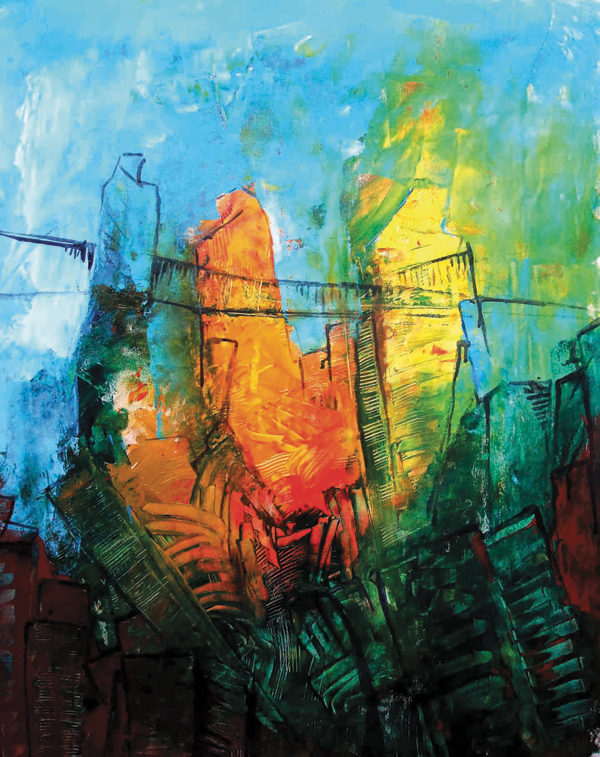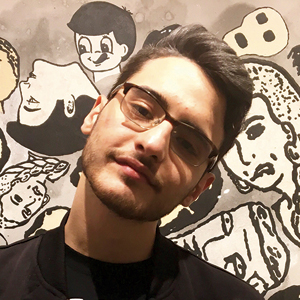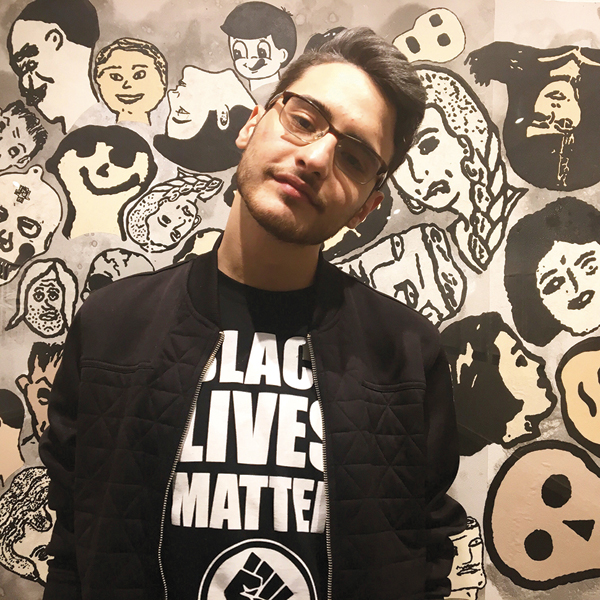Mohammed El-Kurd is an eighteen-year-old poet and writer from Jerusalem, Palestine. Being born on the 50th anniversary of the Nakba was an appropriate sign for someone who would go on to channel so much of his country’s suffering and complexities into his art form. He was first exposed to the public at the age of 11, as the protagonist of numerous documentaries, including the Peabody-award-winning film, My Neighborhood (2009), which focused on settlements in East Jerusalem and Mohammed’s family’s story of dispossession. He continued to speak out about the injustices he saw around him, telling audiences his story at the European Parliament and at multiple American universities, including New York University.
Mohammed has a large online following and is a permanent writer for Fallujah Magazine. He has been published in The Guardian and Medium. His writing, especially his poetry, has sparked media attention and praise – including numerous features in international outlets such as The Huffington Post and Al Jazeera. The award-winning Lebanese author Joumana Haddad said of his work: “I can assert that during my long years of interaction with the Arab literary and cultural scene, as cultural editor of An-Nahar newspaper and former coordinator of the International Prize for Arabic Fiction, and as an author myself, I have never encountered a young voice as talented and unique as Mohammed El-Kurd’s.”
Mohammed writes in both Arabic and English. He considers writing in English as extremely important because the narrative of the Palestinian people has been hijacked, shut down, and manipulated by the English-language press. He writes about the intersections of the Palestinian struggle with resistance movements around the world, social norms and gender, Islamophobia, and the complexities of the Palestinian identity.
Mohammed is currently in his first year at Savannah College of Art and Design in the United States. He hopes to publish his first collection of poetry, titled RIFQA, in honor of his grandmother.
I’m With Them (excerpt)
This is for women –
child-bearing and child-burying
spines of trees, and concrete feet
walking in tribes of grief and power;
throwing stones in the colonized skies
throbbing whispers of stories
in a bent tent,
in a land un-welcoming.
and Her rockets,
once they hit; a bed
a blanket held on to and bit
as if they are giving birth;
only this
is death.
Poetry Doesn’t Turn Water Into Wine (excerpt)
Shy stares accompany my sound
arched back, yet rooted – treed
I stand
god lives folded beneath my tongue;
carpeted the paths I spoke
yet not loud enough for ears to hear
not egotistical or insecure enough for blood to drip
to flood
a kitchen floor, a battleground or
an orphan’s stomach.
To My Inner Villain (excerpt)
Don’t let my silence trick you:
there’s a storm unfolding
within the universes of my throat
ready to be written,
ready to be told.
Rifqa – A Refugee and a Destination (excerpt)
She worked,
worked,
and worked
until survival was a funny story to tell
on nostalgic evenings, with
what remains of the family.
Ears Then Echoes (excerpt)
The streets were renamed
but never re-walked
they don’t know how our feet
take onto the streets
they don’t understand what
land means to us
they don’t see my body
as a root
but my body is treed
and I will fruit their goddamn
colonized roads
with the names they try to deaf and defeat
the truths they tint and neglect
and I’ll brick them a lesson learned
and I’ll brick them a mirror indeed.

Flamboyance Takes Spine (excerpt)
Flamboyance comes burdened,
I’ve carried my truth stitched and altered
in settings I have wandered and settings
that wandered me:
staring eyes in barbershops
different staring eyes at airports
and eyes I have made up.
I Won’t Tell Atlanta About You (excerpt)
Once I get there,
I’ll replant my will to love,
and I’ll worship another city
that will worship me back
until it serves me checkpoints
of another kind.
Warzone Poets (excerpt)
As writers
of backgrounds oppressed, wounded
and stitched with the verb of pain
we cannot choose
for bullets to be metaphors
we cannot use
bruises poetically, blood as a representation
of a non-physical, untouchable red reality
and thirst as another word for drought
we cannot.
Personal Definition (excerpt)
Poetry is an attempt
at rooming the unexplainable shivering
the volcano on the tip of one’s tongue
the wound in which a mother disowns a child
grief and its moons
and chaining all of that in the prison
of comas
and dots



